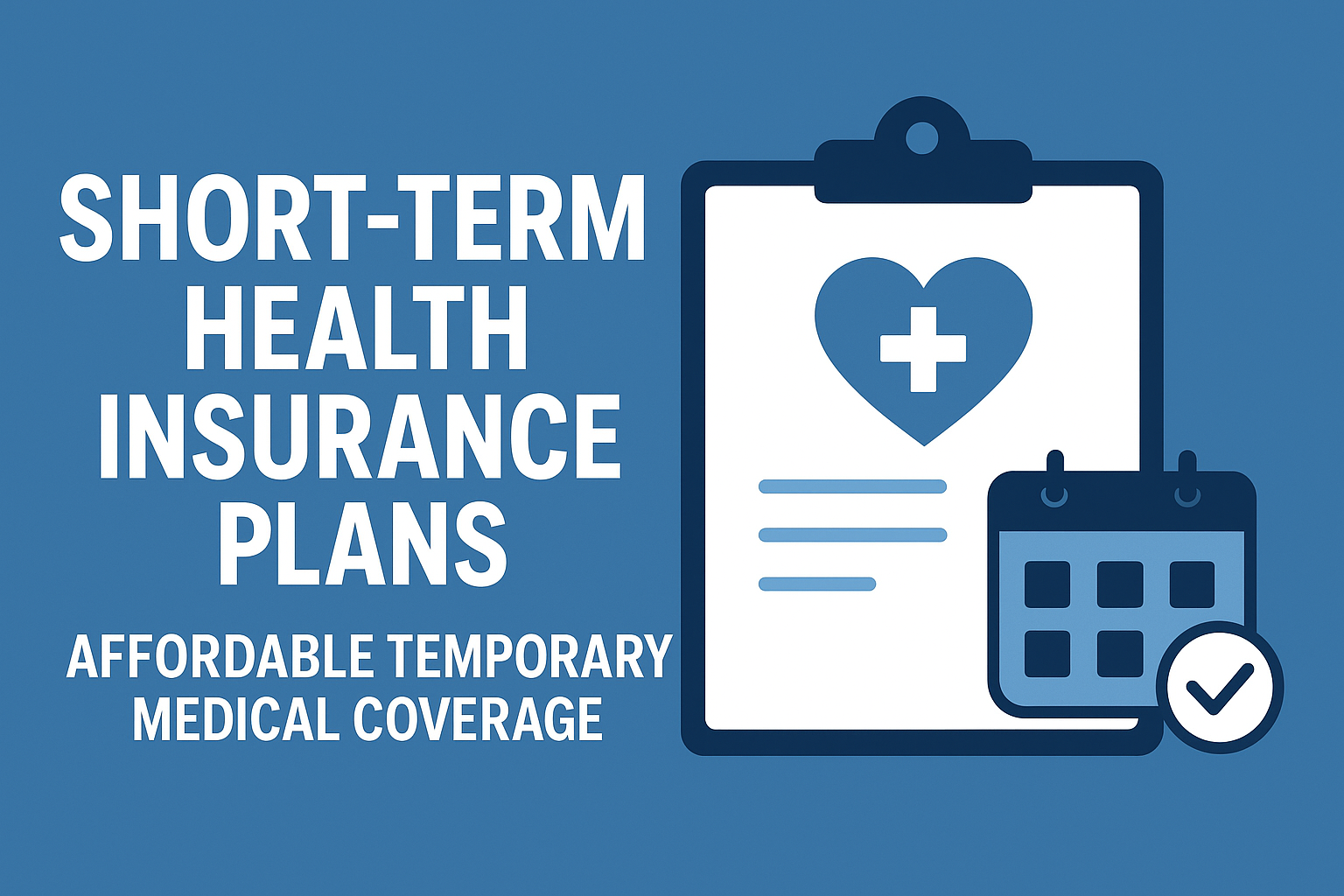In today’s fast-paced world, having continuous health insurance coverage can be challenging. Whether you’re between jobs, waiting for employer benefits to start, or recently graduated, short-term health insurance—also known as temporary medical coverage—can help bridge the gap and protect you from unexpected medical costs.
Short-term health insurance plans are designed for individuals who need affordable, flexible coverage for a limited time. They can last anywhere from 30 days to 12 months (depending on the region and provider), making them ideal for people in transition.

Unlike traditional marketplace Short-term health insurance, these plans typically have lower monthly premiums, faster approval times, and customizable coverage options. The trade-off, however, is that they may not include all the essential health benefits required under the Affordable Care Act (ACA) in the US or equivalent public systems in the UK, Canada, or Australia.
For many, the peace of mind that comes from knowing you’re covered—even temporarily—is invaluable. Short-term policies can help cover the costs of doctor visits, urgent care, hospitalization, lab tests, and certain prescription medications.
Key takeaway: If you’re between permanent health insurance plans, short-term health insurance offers a smart, flexible safety net without long-term commitments.
Explore more details here → Compare short-term insurance providers online to find the best rate in your area.
What Is Short-Term Health Insurance? Understanding Affordable Temporary Medical Coverage
Short-term health insurance provides temporary medical coverage for individuals who need protection during transitional periods. It’s designed to fill gaps when standard coverage is unavailable or too costly.
For example, imagine a software engineer in California who leaves her job in June but her new role—and new benefits—don’t start until September. A short-term health plan ensures she’s covered during those three months at a fraction of the cost of COBRA or individual ACA plans.
Here’s a comparison of coverage features across Tier One countries:
| Region | Typical Duration | Average Monthly Premium | Key Benefits |
|---|---|---|---|
| US | 1–12 months | $90–$250 | Customizable deductibles, quick approval |
| UK | 1–6 months | £40–£120 | Supplemental to NHS waiting list coverage |
| Canada | 1–8 months | CA$70–CA$180 | Ideal for temporary workers & travelers |
| Australia | 1–12 months | AU$80–AU$200 | Flexible for job seekers or expats |
Why it matters: Unlike long-term insurance, short-term policies aren’t tied to open enrollment periods. You can apply anytime and often get approved within 24 hours.
Key tip: Always review coverage exclusions before making a purchase. For instance, most short-term plans won’t cover maternity care or pre-existing conditions, but they do provide excellent short-term protection for sudden illness or injury.
Micro-CTA: Compare instant quotes from providers like UnitedHealthcare, Pivot Health, and Aflac to find your ideal fit.

Why You Might Need Temporary Health Insurance Between Jobs or Life Transitions
Life transitions can create coverage gaps—and even short ones can be risky. A sudden emergency room visit could cost thousands without insurance. That’s where temporary health insurance becomes invaluable.
Real-world example:
A marketing professional in Toronto finished her contract in January and had a 90-day gap before her new position began. Rather than risk being uninsured, she purchased a three-month short-term plan costing just CA$110/month. When she developed bronchitis and needed antibiotics and X-rays, her plan covered 70% of the costs—saving her over CA$800.
Common scenarios where temporary health insurance makes sense:
- Between jobs or waiting for new employer benefits
- Retiring early but not yet eligible for government health programs
- Graduating from college and entering the workforce
- Losing coverage due to divorce or other life events
- Seasonal, freelance, or contract-based employment
| Situation | Why Short-Term Coverage Helps |
|---|---|
| Job Change | Covers you until benefits restart |
| Freelancing | Provides low-cost, flexible protection |
| Travel Abroad | Acts as temporary travel medical insurance |
| Gap Year | Ensures peace of mind during transitions |
Key takeaway: Short-term plans keep you insured during life’s “in-between” moments.
Result: Reduced financial stress and uninterrupted healthcare access.
Explore more details here → Learn how to choose a policy that aligns with your budget and health needs.
Key Benefits of Short-Term Health Insurance for Individuals and Families in Tier One Countries
Short-term health insurance offers more than just gap coverage—it delivers immediate financial and medical protection at affordable rates.
Here are the top benefits for Tier One markets:
- Lower Premiums:
Short-term health insurance costs significantly less than long-term or ACA-compliant plans. Average monthly premiums can be 50–70% cheaper in the US, UK, or Australia. - Flexible Terms:
Choose coverage lengths from 30 days to 364 days, depending on your needs. - Quick Enrollment:
Approval often takes less than 24 hours—ideal for those who need instant protection. - Choice of Doctors and Hospitals:
Many short-term plans allow you to visit any healthcare provider without strict network limitations. - Customizable Deductibles and Copays:
Tailor your plan for either lower monthly costs or higher protection.
| Benefit | Short-Term Plan | Long-Term Plan |
|---|---|---|
| Premiums | Lower | Higher |
| Enrollment Period | Anytime | Limited |
| Coverage Duration | Up to 12 months | Ongoing |
| Pre-Existing Conditions | Usually not covered | Often covered |
| Approval Time | Within 24 hrs | Up to weeks |
Key tip: Short-term plans are best used for temporary protection, not as a permanent substitute for comprehensive coverage.
Micro-CTA: Check with providers like Aetna, National General, or Cigna to compare policy terms in your country.

What You Need to Know About Short-Term Medical Plans and Coverage Limitations
While short-term health insurance can be a financial lifesaver, it’s not without limitations. These plans are designed for temporary protection, not for ongoing medical care.
What’s usually covered:
- Emergency room visits
- Doctor and specialist consultations
- Hospitalization
- Diagnostic tests
- Some prescription medications
What’s not typically covered:
- Pre-existing conditions
- Maternity and mental health services
- Preventive care and routine checkups
- Prescription drug coverage (limited in some plans)
Example:
A family in Sydney purchased a short-term policy during their three-month stay between permanent visas. When their child developed an ear infection, their $150 visit was 80% reimbursed. However, when they tried to claim for a pre-existing asthma checkup, it was denied—highlighting the importance of understanding policy terms.
| Coverage Type | Included? |
|---|---|
| Emergency Care | ✅ Yes |
| Hospitalization | ✅ Yes |
| Pre-existing Conditions | ❌ No |
| Maternity | ❌ No |
| Prescription Drugs | ⚠️ Partial |
| Preventive Care | ❌ No |
Key takeaway: Short-term health insurance is best for unexpected medical events, not long-term treatment or chronic conditions.
Explore more details here → Review the plan’s exclusions before purchase to avoid claim denials later.
How Long Does Short-Term Health Insurance Last in the US, UK, Canada & Australia?
Short-term health insurance durations differ by region due to local regulations.
| Country | Maximum Duration | Renewal Option | Regulation Notes |
|---|---|---|---|
| US | Up to 364 days | Renewable up to 36 months | Regulated under federal/state laws |
| UK | Up to 6 months | Often non-renewable | Typically supplements NHS |
| Canada | 1–8 months | Renewable in select provinces | Popular for temporary residents |
| Australia | 1–12 months | Often renewable | Works as a gap or travel plan |
If you’re in the US, the Trump administration expanded short-term plans up to three years (with renewals). The UK and Canada generally restrict renewals to encourage full coverage integration with public healthcare.
Key tip: Always check your country’s renewal policy. Some insurers allow extensions if your situation remains temporary, while others require reapplication.
Micro-CTA: Visit your local regulatory authority (e.g., CMS.gov, NHS.uk, or HealthDirect.gov.au) for the latest short-term plan rules.

Short-Term Medical Coverage Options with Low Monthly Premiums
Short-term health insurance remains one of the most affordable private insurance options in Tier One countries.
Average monthly premiums (2025 data):
| Country | Avg. Monthly Premium | Typical Deductible | Ideal For |
|---|---|---|---|
| US | $90–$220 | $2,500–$10,000 | Job transitions |
| UK | £40–£100 | £500–£1,000 | NHS waitlist support |
| Canada | CA$70–$160 | CA$1,500–CA$3,000 | Temporary workers |
| Australia | AU$80–$180 | AU$1,000–AU$2,500 | Expats & travelers |
Most plans allow you to adjust your deductible—higher deductibles mean lower monthly costs but higher out-of-pocket payments during claims.
Example:
A self-employed contractor in Melbourne chose a short-term plan with a AU$2,000 deductible, paying only AU$88/month. When he broke his arm, the insurer covered hospital expenses after the deductible—saving him AU$3,700 in total.
Key takeaway: Short-term health plans offer a cost-effective way to stay insured without locking into long-term contracts.
Explore more details here → Compare deductible and copay structures before purchasing.
Flexible Deductibles and Coverage Periods for Temporary Health Plans
Flexibility is what makes short-term plans attractive. You can choose coverage duration (30–364 days) and deductible limits that suit your budget.
Sample Deductible Options (US Market)
| Deductible | Monthly Premium | Out-of-Pocket Limit | Coverage Type |
|---|---|---|---|
| $2,500 | $150 | $10,000 | Basic |
| $5,000 | $115 | $8,000 | Moderate |
| $10,000 | $85 | $6,000 | Economy |
In the UK and Canada, temporary coverage supplements public healthcare rather than replacing it. In Australia, insurers like Bupa and Medibank offer short-term private cover that includes hospital stay protection and ambulance services.
Key tip: Choose your deductible wisely. If you’re healthy and risk-tolerant, a higher deductible plan offers excellent value.
Expert insight: According to Dr. James Foster, a UK health economist, “Flexible deductible structures make short-term coverage ideal for low-claim individuals who simply need risk protection, not full-service care.”
Result: More savings with controlled risk exposure.

Short-Term Health Insurance vs. Short-Term Disability Insurance Explained
Many people confuse short-term health insurance with short-term disability insurance, but they serve different purposes.
| Type | Purpose | Pays For | Typical Duration |
|---|---|---|---|
| Short-Term Health Insurance | Covers unexpected medical costs | Doctor visits, ER, hospitalization | 30 days – 12 months |
| Short-Term Disability Insurance | Replaces income when you can’t work | Percentage of salary | 3–6 months |
While short-term health insurance helps pay your medical bills, disability insurance replaces lost income if illness or injury prevents you from working. For example, if you break your leg and can’t work for two months, disability insurance helps cover bills—while your short-term health plan pays your hospital costs.
Key takeaway: Combine both types for full protection—one for your health, one for your paycheck.
Explore more details here → Check if your employer or insurer offers bundled health + disability packages.
Pros of Short-Term Health Insurance: Fast Approval, Flexibility & Cost Savings
Short-term health insurance shines for those who need speed, simplicity, and affordability.
Top Pros
- Fast Approval: Many plans activate within 24 hours.
- Lower Premiums: Often half the cost of traditional insurance.
- Flexible Terms: Choose 30–364 days, or renew for up to 3 years (US).
- Freedom of Choice: Select doctors or hospitals without network restrictions.
- Cancel Anytime: No penalties or long-term contracts.
Case Study
A digital consultant in New York needed coverage for 5 months between contracts. She enrolled online in under 10 minutes. Her short-term plan cost $170/month—saving $1,400 versus a COBRA plan.
| Feature | Short-Term Plan | Traditional Plan |
|---|---|---|
| Premium | Lower | Higher |
| Enrollment | Anytime | Limited Period |
| Approval | 24–48 hrs | Up to 2 weeks |
| Flexibility | High | Limited |
Key tip: Always review provider reviews and complaint ratios to ensure claim reliability.
Micro-CTA: Compare short-term health plan ratings from Aetna, UnitedHealthcare, or National General before you buy.
Cons of Short-Term Health Insurance: Limited Coverage & Renewal Restrictions
While cost-effective, short-term health insurance comes with limitations you should understand before purchasing.
Main Cons
- No Coverage for Pre-existing Conditions: Conditions diagnosed before the policy start date are excluded.
- Limited Benefits: Does not cover preventive care, maternity, or mental health.
- Non-Guaranteed Renewal: Must reapply after expiration; approval not assured.
- Potential for Denied Claims: If your condition is deemed “pre-existing.”
- No Subsidies: Ineligible for government premium tax credits (US).
| Risk | Potential Impact |
|---|---|
| Denied Renewal | May leave you uninsured mid-year |
| Limited Network | May reduce provider access |
| Out-of-Pocket Costs | Higher for chronic issues |
Example:
An IT freelancer in London had short-term coverage during a contract gap. When he tried to renew after developing diabetes, the insurer declined renewal—forcing him to join a long-term policy instead.
Key takeaway: Use short-term insurance as a temporary bridge, not a replacement for permanent healthcare.
Explore Short-Term Insurance Options from Trusted Providers like Aflac and UnitedHealthcare
When choosing short-term health insurance, working with a reputable provider ensures claim reliability and better customer service.
Top Short-Term Health Insurance Providers (2025)
| Provider | Tier One Coverage | Notable Features |
|---|---|---|
| Aflac | US, UK | Supplemental coverage add-ons |
| UnitedHealthcare | US, Canada | Extensive provider network |
| Cigna Global | UK, Australia, Canada | Worldwide short-term travel health |
| Anthem Blue Cross | US | Custom short-term family plans |
| Manulife | Canada | Affordable for new immigrants |
| Bupa | UK, Australia | Strong hospital network |
Expert Insight:
According to HealthMarkets.com (2025), over 70% of short-term insurance buyers choose top-tier providers due to faster claim settlement times and broader coverage networks.
Table of Contents
Key takeaway: Choose providers that are financially stable and transparent about exclusions.
Micro-CTA: Compare Aflac vs. Cigna short-term quotes side by side for your region.
Compare Short-Term Health Insurance Quotes Instantly Across Tier One Countries
Comparing quotes ensures you find the most affordable plan for your specific health profile and region.
| Country | Online Comparison Portals |
|---|---|
| US | eHealth, Agile Health, HealthMarkets |
| UK | GoCompare, CompareTheMarket |
| Canada | Ratehub, Kanetix |
| Australia | Finder, iSelect |
Key Tip: Always compare:
- Monthly premium
- Deductible & co-pay
- Out-of-pocket maximum
- Renewal options
Example:
A self-employed designer in Brisbane compared three quotes on Finder and saved AU$300 over six months by switching to a plan with similar benefits but a higher deductible.
Result: Instant savings and transparent coverage.
Explore more details here → Use local comparison portals for the best regional deals.
Temporary Medical Plans for Freelancers, Travelers, and Recent Graduates
Short-term health insurance is a lifeline for independent workers and mobile lifestyles.
Who Benefits Most:
- Freelancers: Not tied to employer plans; affordable independence.
- Travelers & Expats: Covers emergencies abroad or between policies.
- Graduates: Protection while transitioning to full-time jobs.
| Category | Common Plan Duration | Typical Cost (Monthly) |
|---|---|---|
| Freelancers | 3–12 months | $120–$250 |
| Travelers | 1–6 months | $80–$180 |
| Graduates | 2–8 months | $90–$200 |
Example:
A graduate in Texas used short-term coverage during a 6-month job search. A minor injury visit cost $600—but her plan paid $480 after deductible, proving invaluable.
Key takeaway: Short-term coverage helps bridge independence with security—especially for modern gig and remote workers.
How to Choose a Short-Term Health Insurance Plan That Fits Your Budget
Choosing wisely can save you thousands.
Here’s a simple checklist before you enroll:
- Define your coverage period (e.g., 3 months vs. 12 months).
- Compare premiums vs. deductibles. Lower premiums = higher deductibles.
- Review exclusions. Pre-existing conditions? Preventive care?
- Check provider networks. Are your preferred doctors included?
- Confirm renewal options. Can you extend if needed?
| Step | Action | Why It Matters |
|---|---|---|
| 1 | Assess duration | Avoid paying for unused months |
| 2 | Compare quotes | Identify cost-effective options |
| 3 | Read fine print | Avoid denied claims |
Key takeaway: Prioritize balance between affordability and protection.
Micro-CTA: Get customized quote comparisons on eHealth or GoCompare instantly.
How Temporary Health Insurance Helped a Freelancer in the US Save $1,200
When Emily, a freelance writer from Chicago, left her employer, she faced a 3-month gap before new coverage. COBRA would’ve cost $420/month. Instead, she opted for a short-term plan at $160/month, covering ER visits and hospitalization.
In February, she caught pneumonia, resulting in a $3,200 hospital bill—her insurer paid 70% after the deductible. Emily saved $1,200 overall, proving that short-term coverage can provide both security and savings.
Key takeaway: Short-term health insurance can deliver real financial relief during career transitions.
Explore more details here → Read case studies on HealthMarkets.com for real-life success stories.
Expert Opinion: “Short-Term Health Insurance Can Be a Smart Bridge Solution,” Says Dr. Amanda Lewis (US Health Economist)
“Short-term medical coverage fills a vital role for Americans and other Tier One workers navigating employment transitions. While not a long-term fix, it provides essential financial protection against medical emergencies that could otherwise devastate savings.”
— Dr. Amanda Lewis, PhD, Health Policy Analyst, USA
According to Dr. Lewis, the most common mistake consumers make is treating short-term plans like full ACA replacements. Instead, view them as bridging tools for financial resilience.
Stats: 2025 reports show over 2 million Americans opted for short-term coverage—proof of rising demand for flexible, affordable insurance solutions.
Key takeaway: With the right understanding and timing, short-term plans offer powerful stop-gap protection without financial strain.
FAQ Section
What Is Health Insurance for Small Businesses with One Employee?
Health insurance for small businesses with one employee refers to individual or group plans tailored for sole proprietors. These policies often include flexible premium structures and tax-deductible benefits. In the US, owners can buy through the SHOP Marketplace, while in the UK, Canada, and Australia, private insurers offer small business coverage options.
How Can Small Businesses with Fewer Than 10 Employees Find Affordable Health Insurance?
Small businesses with fewer than 10 employees can compare SHOP plans, association health plans, or private group coverage. Many providers offer volume discounts or flexible premiums for micro-enterprises.
Tip: Use comparison sites like HealthCare.gov, Bupa, or Sun Life to find affordable regional options.
What Is the Average Cost of Small Business Health Insurance Plans?
Costs vary by country:
- US: $500–$650 per employee/month
- UK: £70–£120 per employee/month
- Canada: CA$90–CA$180 per employee/month
- Australia: AU$100–AU$200 per employee/month
These depend on location, coverage type, and deductible preferences.
Is There Health Insurance Available for Small Businesses with 2 Employees?
Yes. Businesses with 2+ employees typically qualify for group health plans. These offer lower rates than individual coverage and tax incentives for employers.
Key takeaway: Always compare group vs. individual plans to find optimal cost-benefit balance.
What Is the Small Business Health Options Program (SHOP) and Who Qualifies?
The SHOP program (US) allows small businesses with 1–50 employees to provide affordable coverage with tax credits. Eligibility depends on having a valid business and at least one employee besides the owner.
Who Are the Best Providers for Small Business Health Insurance Plans?
Top providers include Aetna, Blue Cross Blue Shield, UnitedHealthcare, Cigna, and Humana in the US; Bupa and Aviva in the UK; Manulife in Canada; and Medibank in Australia.
Micro-CTA: Compare provider ratings before purchasing through a licensed broker.
How Does SHOP Health Insurance Work for Small Business Owners?
SHOP enables small employers to buy group coverage through an online marketplace. Premiums are partially subsidized by tax credits. Employees can choose plans directly within the platform, simplifying administration and compliance.
Which Are the Best Small Business Health Insurance Plans in the US, UK, Canada & Australia?
- US: Aetna Small Business Advantage
- UK: Bupa Health Select
- Canada: Manulife Group Benefits
- Australia: Medibank Business Care
Each offers tiered pricing, preventive care, and wellness incentives to promote employee health.





